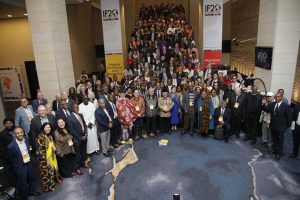CAPE TOWN / WAM
The Muslim Council of Elders is co-organising the G20 Interfaith Forum (IF20), hosted in Cape Town, South Africa, from 10th to 14th August 2025, under the theme “Ubuntu in Action: Focusing on Marginalised Communities.”
The Forum unites a coalition of global voices dedicated to shaping inclusive and ethical policies, bringing together religious leaders, civil society organiations, government officials, multilateral institutions, and scholars to explore collaborative solutions to urgent global challenges.
In its address during the Forum’s opening session, the Muslim Council of Elders underscored the vital role religious leaders can play in addressing today’s global challenges, including conflicts, wars, and disputes.
It advocated for a nuanced, multi-level understanding of relationship dynamics, encompassing both violence and peace.
Judge Mohamed Abdelsalam, in a speech delivered by Adama Dieng, former United Nations Under-Secretary-General and advisor to the Council, emphasised that the time has come to demand justice for our planet, particularly in light of the suffering endured by the Palestinian people and the proliferation of wars and conflicts that have left tens of thousands dead, wounded, or displaced. This crisis, he noted, represents a profound test of our shared humanity.
He further highlighted that the Muslim Council of Elders, under the chairmanship of His Eminence Dr. Ahmed Al-Tayeb, the Grand Imam of Al-Azhar, is spearheading concerted efforts to promote peace, social cohesion, and ethical leadership.
These initiatives are grounded in a value-driven and practical approach, emphasising the role of faith in tackling pressing global challenges, fostering interfaith dialogue, empowering youth, and promoting values of tolerance, coexistence, and human fraternity.
Judge Abdelsalam also pointed to the Council’s efforts to strengthen its presence and impact across Africa through innovative initiatives focused on peacebuilding, empowering local religious actors, and expanding partnerships with regional institutions.
These efforts align with the G20 Interfaith Forum’s (IF20) focus on addressing the continent’s unique challenges and opportunities. The Council also expressed its support for the G20 Interfaith Forum’s call to “leave no one behind,” particularly in areas such as food security, migration, and the economic and spiritual dimensions of justice.
It urged religious leaders to issue a collective call for a return to values of justice and peace and to work toward halting all wars and conflicts for a brighter future for humanity.
 The Gulf Time Newspaper One of the finest business newspapers in the UAE brought to you by our professional writers and editors.
The Gulf Time Newspaper One of the finest business newspapers in the UAE brought to you by our professional writers and editors.
